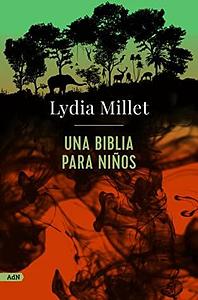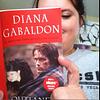You need to sign in or sign up before continuing.
Take a photo of a barcode or cover
3.5 strange, interesting, but I’m not sure it went anywhere.
dark
mysterious
medium-paced
Hiding our parentage was a leisure pursuit, but one we took seriously. Sometimes a parent would edge near, threatening to expose us. Risking the revelation of a family bond. Then we ran like rabbits. We had to hide the running, though, in case our haste betrayed us, so truer to say we slipped out quietly. When one of my parents appeared, my technique was: pretend to catch sight of someone in the next room. Move in a natural manner toward this figment of my imagination, making a purposeful face. Go through the door. And fade away.
A Children's Bible begins with a group of old college friends spending a summer together in a huge rented house, with spouses and children in tow. But unlike most adult fiction, we don't get to know the friends. They're just hazy, drunken figures, as the story is told from the point-of-view of the children. Initially, it seems to be a collective viewpoint, but eventually it becomes clear that teenage Eve is telling her story. Along with their game of hiding their parentage and avoiding their parents as much as possible, the children -- ranging from 17 to maybe 10 or 11 -- are relegated to sleeping communally in the attic. At one point, they decide to go camp on the nearby beach despite half-hearted protests from their parents, where they meet some wealthier counterparts summering on a yacht. We know the setting is modern, because they have cell phones which have been locked up for the summer. Otherwise, the story could easily be taking place in the 1970s with the nostalgic, endless summer feel.
When a severe storm sweeps through the area -- somewhere on the east coast -- the story changes to a survival story with a post-apocalyptic flavor as society breaks down in the wake of the storm. The parents are mostly useless and the children must rely on their own strengths and some less-conventional, less-horrifying adults they encounter. Eve's younger brother Jack has been given a copy of A Children's Bible -- one of those illustrated versions that featured in my childhood -- which is basically his first introduction to religion. He and his deaf friend try to decipher the meaning of the myths, which they're positive are related to the events they're living through. Ms. Millet lays all the Biblical allusions on thick, with the narrator's name being just the beginning.
I wasn't sure what to expect when I started reading this, and I'm still not entirely sure what happened. It's interesting and messy and often heavy-handed. As long as I don't overthink it, I liked it.
A Children's Bible begins with a group of old college friends spending a summer together in a huge rented house, with spouses and children in tow. But unlike most adult fiction, we don't get to know the friends. They're just hazy, drunken figures, as the story is told from the point-of-view of the children. Initially, it seems to be a collective viewpoint, but eventually it becomes clear that teenage Eve is telling her story. Along with their game of hiding their parentage and avoiding their parents as much as possible, the children -- ranging from 17 to maybe 10 or 11 -- are relegated to sleeping communally in the attic. At one point, they decide to go camp on the nearby beach despite half-hearted protests from their parents, where they meet some wealthier counterparts summering on a yacht. We know the setting is modern, because they have cell phones which have been locked up for the summer. Otherwise, the story could easily be taking place in the 1970s with the nostalgic, endless summer feel.
When a severe storm sweeps through the area -- somewhere on the east coast -- the story changes to a survival story with a post-apocalyptic flavor as society breaks down in the wake of the storm. The parents are mostly useless and the children must rely on their own strengths and some less-conventional, less-horrifying adults they encounter. Eve's younger brother Jack has been given a copy of A Children's Bible -- one of those illustrated versions that featured in my childhood -- which is basically his first introduction to religion. He and his deaf friend try to decipher the meaning of the myths, which they're positive are related to the events they're living through. Ms. Millet lays all the Biblical allusions on thick, with the narrator's name being just the beginning.
I wasn't sure what to expect when I started reading this, and I'm still not entirely sure what happened. It's interesting and messy and often heavy-handed. As long as I don't overthink it, I liked it.
Profoundly allegorical, “A Children’s Bible” comments on climate change and generational divides as a group of children pursue the wilderness after a catastrophic event while on vacation with their parents. I did find some issues with where the story went, but it was still a pleasant read with many more layers to dive into (that could even work for a collegiate level literature course).
This book was neither here nor there for me. It was a nice take on the end times but a few confusing moments happened for, like the electricity not fully shutting off, the availability to Google, the endless supply of cocain. Over all it was worth reading but idk if I'd recommend it
So interesting and weird. I did think all the kids (except maybe Eve and Jack) were interchangeable. Trying to match the things that were happening to the corresponding bible story was cool, and I liked the very literal Deus ex machina. Also enjoyed the skewering of the rich, educated parents who brought nothing to the post-apocalyptic table
Ice cold writing--sharp, unflinching and merciless. It's an incredible story about the disaster of climate change which Millet makes perfectly plausible (which is terrifying). Her teenage dialogue is so authentic and funny but the teens' earnestness and self-awareness are what make the novel so moving. I love Millet's other books and A Children's Bible is like a highly concentrated version of her others. There is not an extra word or a stray idea. It's masterful.
this isn't a perfect book by any stretch of the imagination, but i'm giving it 5 stars for a kind of solid cli-fi dystopia that i could read without getting a panic attack. thank you lydia miller
i've owned and had this book on my dresser for upwards of 3 years now and i'm so happy i finalllyyyy finished it. really sweet and interesting. i liked the humor of the kids. i don't mind that they're all kind of archetypal. i think it works for the limited-language kind of style and the amount of space in the topic that they were granted. this is allegory this is a parable this isn't a character study and i'm cool with that.
i've owned and had this book on my dresser for upwards of 3 years now and i'm so happy i finalllyyyy finished it. really sweet and interesting. i liked the humor of the kids. i don't mind that they're all kind of archetypal. i think it works for the limited-language kind of style and the amount of space in the topic that they were granted. this is allegory this is a parable this isn't a character study and i'm cool with that.
A cli-fi story told from the POV of a group of young people who, when environmental disaster strikes, set off without their indifferent parents in order to survive. I liked the use of first person plural throughout this novel, and moments of awe and reverence for nature. Interesting religious allegories. The youth will save us!
“Why are we always complaining? We get to be alive.”
“Why are we always complaining? We get to be alive.”




